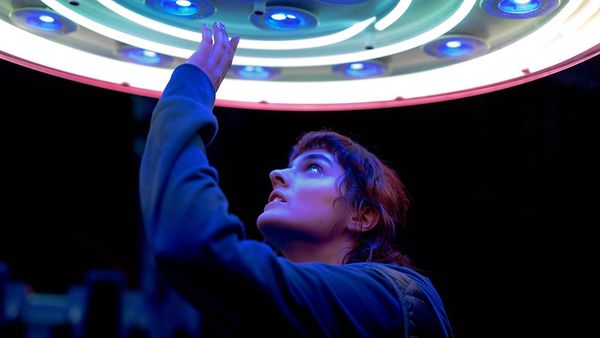Eye For Film >> Movies >> Jumbo (2020) Film Review
Jumbo
Reviewed by: Jennie Kermode

The phenomenon of sexual and romantic attraction to objects (beyond mere sex toys) is something that has received increasing attention in recent years, though in most cases it's still treated as a joke. If you struggle to make sense of it, it might help to reflect on the fact that anthropomorphising objects is actually something that most of us do to a degree, from forming strong emotional attachments to childhood toys, to naming and gendering Roombas. Animism is a key component in many religions and traces of it can be found early on in practically all human civilisations, often linked to the idea that if an object is cared for enough for long enough, it acquires a soul. We accept the idea of naming swords, 'treating' cars to a wash or polish and shouting at badly behaved computers, so why is it so hard to accept that for some people, such behaviours would progress a little further?
The difficulty, perhaps, lies in the extent to which we regard sex itself as disturbing and, if it fails to meet with our approval, as disgusting. Strong emotional responses like this can be difficult to overcome - almost as difficult as desire itself - and this may account for some of the critical hostility to Zoé Wittock's Jumbo. There is also, of course, a suspicion upon encountering a film of this type that it's just latching onto an issue rather than telling a story of its own, and it's fair to say that Jumbo doesn't have a great deal going on beyond the central idea. It's a far from perfect film, but it's a lot better than the critical consensus suggests, and at the heart of it is a fascinating character study.

Jeanne (Noémie Merlant) is a young woman ill at ease with her body and her sexuality. We can see it in the way she moves, the way she holds her face and arms, and the way other local young people mock her, picking up on an inability to fit in that has presumably been apparent for some time. She has clearly internalised a lot of this. The situation is exacerbated by her mother Margarette (Emmanuelle Bercot), who wants her to be happy but thinks the route to achieving this is through making her normal. Consequently, Jeanne has had very little opportunity to explore her own desires, sexually or otherwise. When the boss at the theme park where she works starts hitting on her (in a manner many people would consider inappropriate), her mother encourages a romance between the two of them, and Jeanne sullenly goes along with it despite the fact that her real desires lie elsewhere.
The titular Jumbo is a new ride whose arrival at the theme park changes everything for her. The way she's drawn to him (this is a French language film so gender comes naturally) without really knowing why is something that many viewers will relate to if they think back to their first childhood crushes. Wittock bathes him in a sensual glow, his lights recalling the colours of dancehalls in romance films, whilst Jeanne, who regularly cleans and carries out small repairs on the rides, caresses his smooth flanks and presses up against him. To her he seems like a living thing, responsive, even conversational in his alien way. This is presented as if it were a hallucination or something real that only she can see, which is a bit heavy-handed but makes room for the use of familiar, albeit reattributed, erotic tropes. The thrill of the ride becomes, for Jeanne, something far more intense.
It is in structuring the story around this that Wittock runs into more difficulty. Though she has a point to make, sticking too closely to the bones of a conventional romance plot deprives the central relationship of some of its specificity and, thereby, its power. It's hard to believe that such an intimate and daring relationship would fall into a pattern that seems, by comparison, achingly trivial. Romance isn't the whole of the picture, however. A good deal of the film is focused on the complex relationship between Jeanne and her mother, who might ultimately find it easier to connect to a daughter who is becoming an adult than to one who failed to satisfy her expectations as a girl.
There's a likeable turn from Sam Louwyck as Margarette's boyfriend, who seeks to make peace between the two, even if he does get some rather twee lines, whilst Bastien Bouillon brings an interesting combination of sleaze, bitterness and pathos to the role of the man who faces the indignity of playing second fiddle to a machine in Jeanne's affections. Jumbo is an odd little film but should be credited for daring to tread on difficult ground, and it succeeds in bringing humanity, if not to machines, then to the people who love them.
Reviewed on: 26 Feb 2021
















